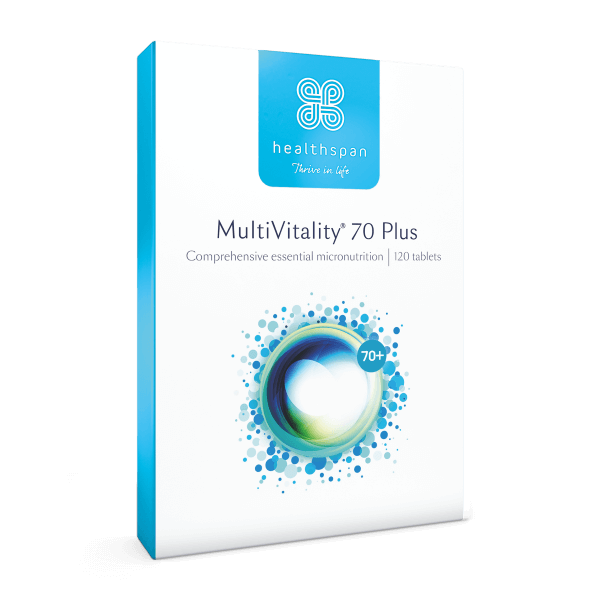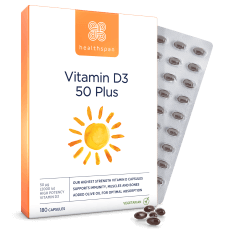Nutrient needs change as we age. Patsy Westcott discovers why the best supplements for older people are supercharged with certain vitamins and minerals.
🕒 7 min read
As we get older several changes occur that mean every bite of food has to count. Our metabolism slows and many of us find ourselves becoming less active than in earlier years. Our appetite often dwindles, leading us to eat smaller meals.
Yet, although portion sizes may shrink, our nutrient needs remain the same and may even increase due to chronic illness, medications, changes in the digestive system affecting nutrient absorption and other factors.
All this can mean we are more at risk of shortages of important micronutrients (vitamins, minerals and trace elements.) A large review of studies, involving more than 28,000 older people aged 65 or more living in the West, highlighted six nutrients potentially of concern: vitamin D, thiamine (vitamin B1), riboflavin (vitamin B2), calcium, magnesium and selenium.
It also revealed that 30% of older individuals were at risk of an insufficient intake of calcium, magnesium and selenium from food alone.
In the light of such findings, although a healthy diet is always a basic pillar of health, taking a specially tailored age-specific supplement could be a sensible move to help ensure you get the nutrients you need to stay strong and healthy and feel your best in the years ahead. Here's what can change as you age, and how it can affect your nutrient intake.

Changes to hunger, taste and digestive system as we age can all affect our nutrient intake and how much we absorb. Supplements can help plug the gaps.
Changes to appetite and hunger
Appetite and hunger tend to diminish as we get older, while we feel fuller more easily. A 2016 review found that individuals in their 70s consume 16-20% fewer calories, experience 25-39% less hunger, and feel 37% fuller compared to those in their mid-20s.
The result? We tend to eat less with the passing years, which over time can lead to weight loss and under-nutrition.
Changes to smell and taste
As we age our sense of smell dulls, which has a knock-on effect on our ability to taste. Specifically, we become less able to perceive flavours such as sweet, salty, sour and bitter flavours. This in turn can impact the pleasure we take in eating, with the result that we may eat a more limited diet. This in turn can lead to nutrient deficiencies.
Changes to the digestive system
Ageing also brings changes throughout the digestive tract, which extends from the mouth to the anus. As well as increasing weakness of the muscles that control swallowing and slower stomach emptying, the number of nerve cells lining the wall of the digestive tract dwindles.
Together with shrinkage of the tiny finger-like structures (villi) in the small intestine, this can reduce our ability to absorb nutrients.
Changes to acid production
One particular condition has a big influence on how well we absorb nutrients. Hypochlorhydria, or low stomach acid, can lead to poor absorption of iron, Small Intestinal Bacterial Overgrowth (SIBO), and excess of gut bacteria in the small intestine, as well as vitamin B12 deficiency.
The condition is often linked to chronic autoimmune atrophic gastritis (CAAG), in which the immune system attacks the cells that produce acid, together with a protein needed for the absorption of vitamin B12. Other deficiencies linked to CAAG include vitamin C, vitamin D, folic acid and calcium.
Illness and medication
It's a sad fact that as we age many of us accumulate more and more chronic illnesses, which often leads to us taking an increasing number of medications. Polypharmacy (defined as taking five or more medicines) can in turn trigger nutrient deficiencies.
In a 2021 Australian review, researchers highlighted vitamin B12, sodium and magnesium as three major nutrient deficiencies likely to be sparked off by medications for cardiovascular disease, neurological and gastrointestinal conditions, and diabetes. Coenzyme Q10 was identified as likely to be depleted by statins.
MultiVitality 70 Plus
Comprehensive multivitamin for those over 70
- B vitamins, iron and zinc contribute to cognitive health
- High levels of vitamin D3, vitamin K, magnesium and calcium help maintain normal bones
- Co-enzyme Q10 and vitamin B1 for normal heart function
Common medications and their effect on nutrients
Medication | Use | Effects |
Proton pump inhibitors (PPIs) | To suppress acid in indigestion and other digestive problems | Reduce absorption of vitamin B12, vitamin C, calcium, iron and magnesium |
Antacids containing aluminum/magnesium hydroxide | For indigestion | Decrease absorption of folate, iron, and phosphorus |
Angiotensin converting enzyme (ACE) inhibitors | To treat high blood pressure and heart failure | Linked with zinc deficiency |
Aspirin | To reduce unwanted blood clotting | Can deplete iron and vitamin C |
Statins | To treat high cholesterol | Lowers blood levels of coenzyme Q10 May lower levels of vitamin D |
Metformin | To lower blood glucose in diabetes and pre-diabetes | May lower levels and absorption of vitamin B12 Supplementation can help counteract this |
Steroids (corticosteroids) | To lower inflammation in conditions such as polymyalgia rheumatica (PMR), which is more common in older people | Increases risk of bone loss and fractures Usually prescribed with calcium and vitamin D to counteract this Reportedly causes sodium and water retention and increases loss of potassium, potentially leading to high blood pressure May cause increased excretion of chromium |
Selective serotonin reuptake inhibitors (SSRIs) | To reduce depression | Linked with increased risk of osteoporosis Calcium and vitamin D supplementation may be recommended |
A US study on the interactions between medications and nutrients concludes that a daily multivitamin and mineral supplement "may be a practical and efficacious way to maintain or improve micronutrient status in (people) at risk of deficiencies, such as those taking medications known to compromise nutritional status."
These changes and medicine-related deficiencies mean that it makes sense to choose a vitamin and mineral supplement specifically tailored to your age group.
Aged 50+ Look for a supplement that provides 150% to 200% of the recommended daily allowance (RDA) or nutrient reference value (NRV), to help counter reduced absorption. Look out too for extra ingredients such as antioxidant-rich citrus flavonoids and herbs such as Ginkgo biloba to help maintain the health of your brain, heart, muscles, bones, teeth and energy levels.
Menopausal? Look for supplements containing higher levels of bone-building nutrients such as vitamin D, calcium and magnesium. Also look for added extras such as soy isoflavones, which mimic the action of oestrogen to support the healthy balance of hormones.
Aged 70+ Look for a supplement containing 200% to 300% of key nutrients including B vitamins, which our bodies find more difficult to absorb as we get older. Added extras to look for include energising nutrients such as alpha-lipoic acid, L-carnitine, coenzyme Q10 and Siberian ginseng.
Essential vitamins for older people
Vitamin B12
Vitamin B12 deficiency is especially common as we age and has been linked to an increased risk of anaemia, cognitive decline, and dementia. It is estimated to affect between 20% and 40% of people aged over 60.
Vitamin D
We all need vitamin D, mainly produced in our skin from sunlight, for good health, but it becomes especially important as we age. That's because our body becomes less efficient at converting vitamin D into its active form as we get older.
We also become less efficient at absorbing vitamin D from foods such as oily fish, egg yolks, liver, and fortified foods. What's more, the ability of our kidneys to produce this active form of vitamin D dwindles.
And that's not all. From the age of around 65 to 70 years our bodies become less able to absorb calcium, which works with vitamin D to help keep our bones strong and to support healthy immunity.
That's why the Health Executive Service (HSE) recommends that adults at risk of deficiency take a daily vitamin D supplement throughout the year.
The list of those at risk includes adults aged over 65, people who stay indoors a lot and don't get as much sunlight, those with malabsorption problems and those taking certain medications.
A 2024 study, meanwhile, suggests that vitamin D may target many of the hallmarks of ageing – including chronic inflammation, imbalances in gut bacteria, changes in communication between cells, and decline in the number and function of the stem cells from which all our other cells derive. All these can contribute to poorer health as we get older.
Vitamin D3 50 Plus
50 µg vitamin D3 in easy−swallow, highly absorbable capsules
- Healthspan's strongest vitamin D
- Supports bones, teeth, immunity and muscles
- Highly absorbable formulation
Vitamins for immunity
A range of vitamins and minerals, especially A, C, D, E, B2, B6, B12, folic acid, iron, selenium and zinc, are vital for healthy immunity. Our immune system gradually declines and weakens as we get older, often due to micronutrient deficiencies.
A comprehensive 2018 review of the role of vitamins and minerals and immunity across our lifespan suggests that this deficiency is a factor in oxidative stress and inflammageing: the increased levels of inflammation linked to the many chronic diseases that become more common as we age.
The researchers attribute the same factors to the increased risk and severity as we age of infections such as 'flu, other lower respiratory infections like pneumonia, and urinary tract infections (UTIs).
They also note that taking a multivitamin and mineral supplement in later life may reduce the need for antibiotics and boost our immune response to vaccination.
The same review suggests that 'tailored supplementation based on the specific needs of each age group' may help to support optimal immune function as well as reducing the risk and severity of infections and supporting faster recovery.








